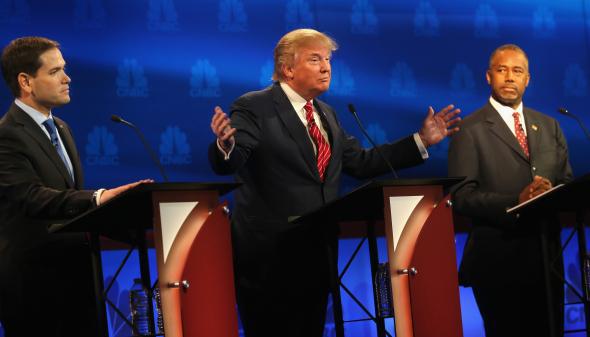In a Godfather-esque gathering of rival political concerns, representatives of the Republican presidential campaigns gathered in an Alexandria, Virginia Hilton on Sunday evening to draw up a list of conditions for their participation in future presidential debates. The campaigns still are all het up about the completely unfair questioning that business-Republican network CNBC subjected them to last week, such as, Marco Rubio, your tax plan is really good for the wealthy, no? or, Ben Carson, why were you in bed with this snake-oil company for so many years? If the moderators had asked fair questions, see, the candidates wouldn’t have been forced to lie. What’s so complicated about that?
The view of the campaigns is that the Republican National Committee has failed in its mission to prevent moderators from asking them uncomfortable questions to which they may not have truthful answers. The candidates have thus decided to cut out the middleman, since it’s their smiling, sweaty faces that have all the leverage. The RNC was not represented at the Sunday night meeting—code-named “family dinner,” no joke—even after it tried to mollify campaigns’ outrage by suspending NBC News and Telemundo’s sponsorship of a February debate.
The campaigns and their consiglieres put together a list of demands to which future debate hosts must agree to ensure the candidates’ participation. The finalized version, as obtained by the Washington Post, is hilarious in its granularity. Not once but twice does the document inveigh against “lightening [sic] rounds,” which must be banned “because of their frivolousness or ‘gotcha’ nature, or in some cases both.” The letter also implores networks to agree not to “ask the candidates to raise their hands to answer a question,” “allow candidate-to-candidate questioning,” “allow props or pledges by the candidates,” “show an empty podium after a break (describe how far away the bathrooms are),” or “leaves microphones on after breaks.” What about allowing hot mics in the distant bathrooms? There’s no clear rule on that, though it would certainly violate the spirit of the letter.
“Can you pledge that the temperature in the hall be kept below 67 degrees?” the very funny letter asks of television network executives. The campaigns also demand final approval over any graphics that will appear onscreen with their candidates—something the Bush campaign pushed after CNBC, a financial news network, displayed Jeb’s investment bank consulting background rather than his two terms as governor of Florida.
These are still rival campaigns, though. While they will band collectively to prevent such things as reporters asking them questions about the chasmic gaps in their tax plans, each campaign still has its own interests to push. Consider this NBC News/Telemundo business. The Bush camp wants them reinstated, since Jeb’s whole message is about broadening the appeal of the party and he speaks Spanish. But Trump’s campaign manager, Corey Lewandowski, “threatened to boycott a debate if the Spanish-language network that Trump has clashed with was granted one.” Trump’s rhetoric on Hispanics might not go over well with Telemundo’s moderators and audience. And since Trump deserves credit for the large audiences GOP debates are commanding, he would seem to hold more leverage than Bush.
It’s not a good sign for the RNC, or the eventual Republican nominee’s chances next November, if Trump is effectively calling the shots. (Indeed, Trump is now talking about breaking from the collective entirely and negotiating debate details on his own.) If Trump gets his way NBC News and Telemundo will not be reinstated, and the Republican Party will finish its presidential primary schedule without a single debate on Spanish-speaking media. Telemundo, meanwhile, is reportedly in discussions with the Democratic National Committee about setting up a forum for its candidates instead. This means that Democrats, who already have a Univision-hosted debate scheduled, are poised to host two events on Hispanic media networks to the Republicans’ zero.
This is not what Chairman Reince Priebus hoped for when his RNC drafted its “autopsy” of the 2012 election. “The RNC must put significant effort and resources into reaching out to Hispanic media and news outlets,” the 2013 report concluded. “This needs to be a high-level presence on all Latino media.” Well, now the candidates have bullied the RNC into cancelling the party’s one big night on Hispanic media because its partner, NBC News, operates under the same parent company of CNBC, a channel that worships money but also asked a few mean questions. And Trump, whose “racially divisive” platform and rhetoric has commanded great audiences and catapulted him to the top of primary polls, appears to have little interest in renegotiating.
Really, really not how things were supposed to go. What’s next? A debate moderated by Sean Hannity, Rush Limbaugh, and Mark Levin? That’s what Sen. Ted Cruz wants. If he and the other campaigns that have now taken control of the process get this, that’s not going to show the party’s best face for a general election audience that’s weighing whether to vote Republican or Democrat in 2016.
What was the point of having the RNC serve as middleman in the first place? To navigate the party through the primary process in a way that didn’t damage the eventual nominee too much before the general election. Priebus was able to cut the number of debates roughly in half, and he ensured that no mischievous entity like MSNBC was granted hosting duties. The candidates have found his efforts lacking, though, and are using the leverage that’s available to them as a group to run the show themselves. So far, it looks like they’ll use that power to ensure that they don’t, for even a hot second, have to factor general-election considerations into their primary strategies.
